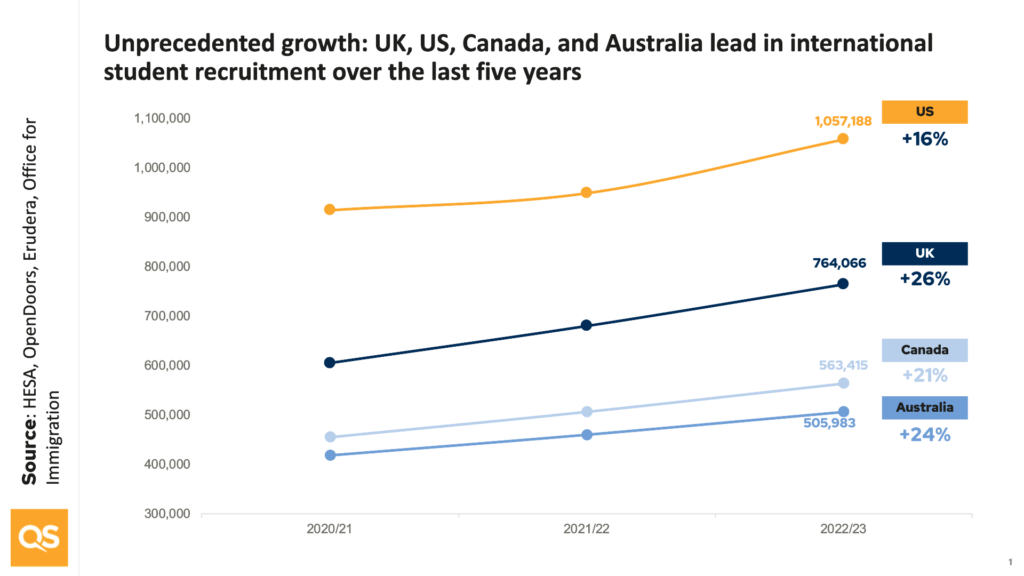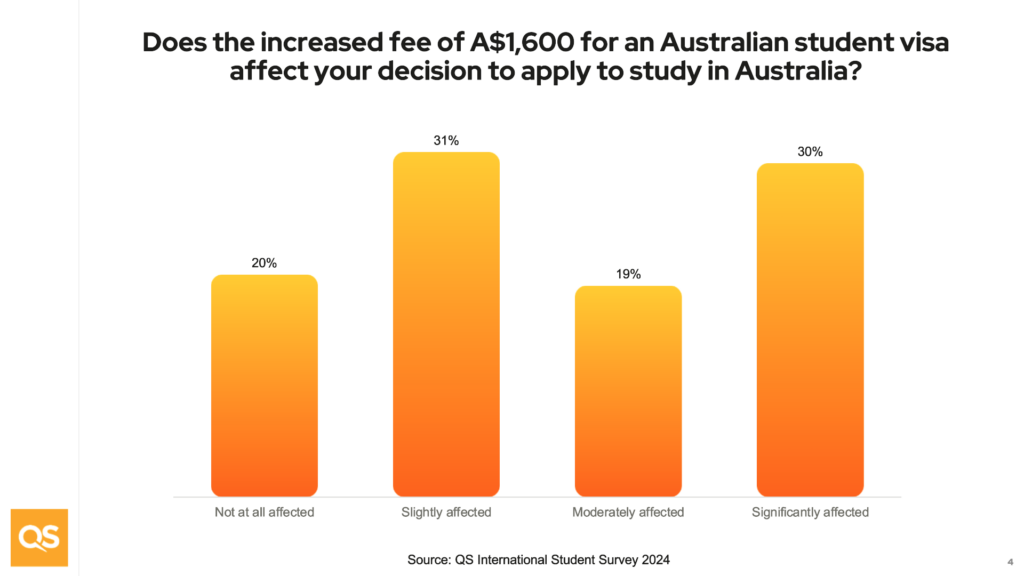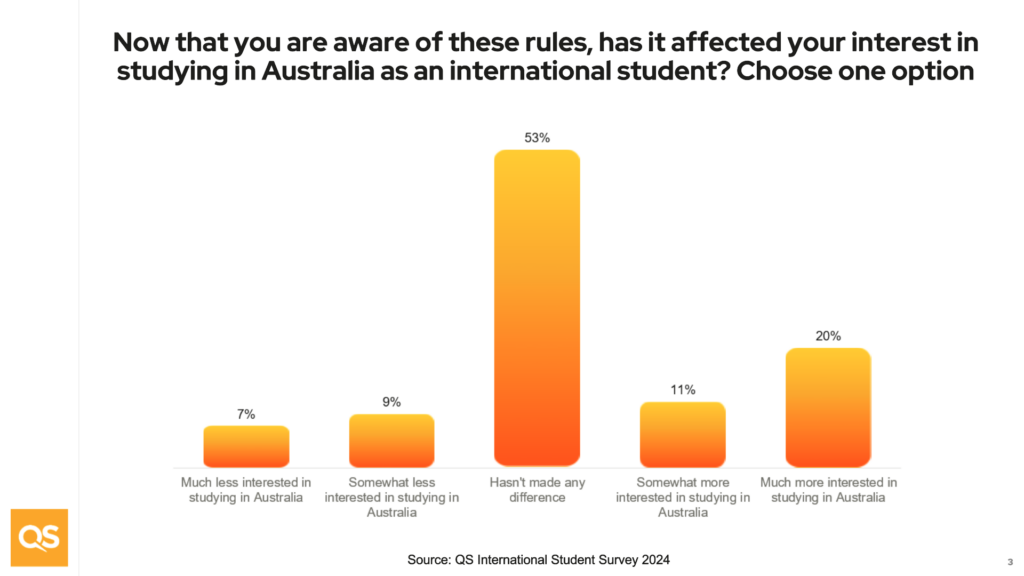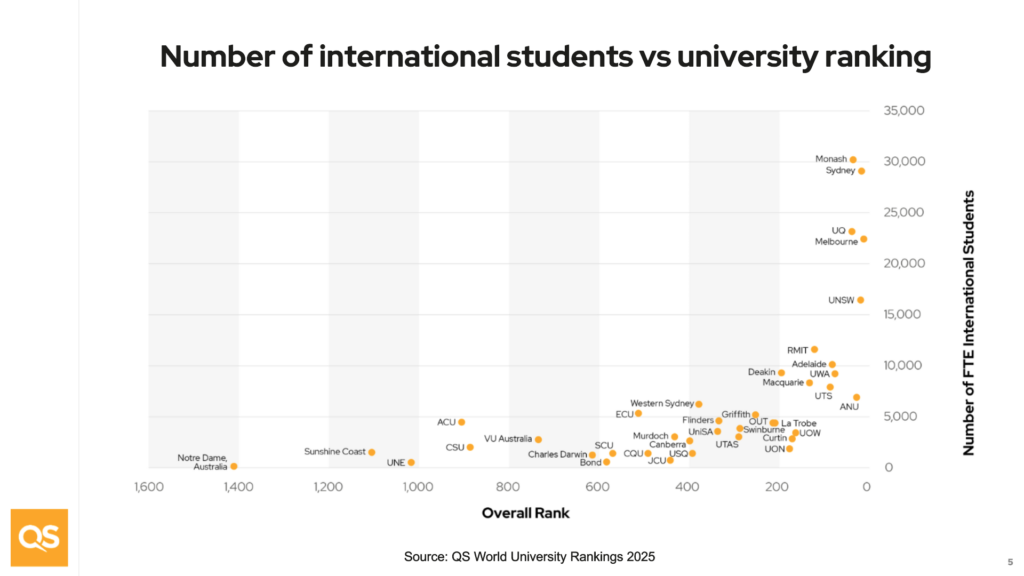
The Australian government has officially announced new caps on international student numbers, which will come into effect in 2025 if legislation is passed. International students enrolling in the country’s higher education institutions will be capped at 270,000 and favour publicly funded universities, while those with already high ratios of international students will receive a smaller allocation.
Experts have warned that these measures could hinder Australia’s economic growth and the country’s reputation as a leading international study destination, as the VET sector and private colleges consider downsizing measures.
Australia’s international student population has grown by 24% over the last five years – the second highest growth rate among the ‘big four’ markets, trailing the UK with a growth rate of 26%. This indicates a strong appeal and increasing attractiveness of Australian institutions to international students.
Melbourne is the world’s fifth best student city and Australia’s leading student destination, but international student caps put this all at risk.

A new hurdle for Australia’s global student market
In 2024, Australia has another challenge impacting its reputation as a world-leading study destination. In July, the Australian government increased the cost of acquiring a student visa significantly, from $710 to $1,600 AUD.
QS International Student Survey 2024 data shows that Australia-bound prospective international students think the attainability of a work visa after graduating and an affordable cost of studying are both important factors when choosing a course.
Data from the QS Country Perceptions Survey 2024 aligns with this. 80% of surveyed students feel that the increased fee will affect their decision to apply to study in Australia. 30% say it significantly affects their decision. This perception could lead to a downturn in the number of students considering Australia as a study destination.

That said, the same dataset revealed that only 16% of prospective students feel they are less interested in studying in the country now that they know about new rules restricting international student enrolments in Australia.
Over half of survey respondents say it hasn’t made any difference (53%), but we know that 70% of prospective students see cost of living as the biggest worry when considering studying in Australia (QS International Student Survey 2024), suggesting there is a bigger picture to take into consideration.

Over 70% of prospective international students looking to study in Australia said the cost of living was a worry.
QS International Student Survey 2024
A shift in distribution across Australia’s institutions
When comparing the number of international students with university rankings, QS World University Ranking data shows that the number of international students is disproportionately concentrated in the hands of a small number of highly ranked institutions – but only at the very top of the rankings does this become particularly evident.

However, the Australian government has confirmed that, with the implementation of the international student caps in 2025, institutions with a “higher ratio of international students will receive a lower allocation, encouraging them to diversify their student base.”
QS Partnerships Director for Australia and New Zealand, Shelly Maller, said “The universities with the highest proportion of international students are likely to be the most affected by these changes. Economic modelling from The University of Sydney forecasts significant financial repercussions, projecting a potential $4.1 billion AUD loss to the Australian economy and approximately 22,000 job losses by 2025.
“With enrolment limits now in place, some believe these could streamline visa processing and benefit specific education providers, while others feel that reducing student numbers at some universities may not provide broad benefits across the Australian education sector.”
Our recommendations for Australian universities
As the Australian higher education sector prepares for the new policy, how can universities address student concerns about rising costs and navigate an increasingly competitive international market to maintain economic stability?
Enhance financial aid and scholarships
Over half of international students interested in studying in Australia (51%) consider scholarships to be one of the most important factors when choosing a university (QS International Student Survey 2024).
In an increasingly competitive international market, showcasing a range of financial options such as tuition fee support, living cost bursaries and additional support for personal circumstances can help students overcome financial barriers and view Australian higher education as a more attainable possibility. Providing funding information during the recruitment process is essential as prospective students are actively researching relevant details.
Build and maintain impactful partnerships
As global markets shift and world challenges intensify, partnerships play an increasingly key role in fostering cross-cultural collaboration and innovation, the exchange of diverse perspectives, enhancing research capabilities, and enriching the academic experience to prepare students for a globalised workforce.
Nurturing partnerships with industry, governments and other organisations can also create innovative funding models, sharing resources and reducing overall costs. These partnerships can help to mitigate the impact of the cap policy, ensuring that universities remain globally competitive and financially sustainable.
Enhancing career support services
A university that leads students to their chosen career path is the most important factor for 50% of international students looking to study in Australia (QS International Student Survey), highlighting their career-driven expectations on institutions. Despite concerns over rising visa costs, Australia still offers two to three years of post-graduation work opportunities through the temporary graduate visa.
Australian universities must continue to demonstrate how the skills and experiences gained through their programmes provide a solid return on investment, reassuring students of the value of an Australian degree.
Highlight value propositions
International students place significant importance on finding a safe and welcoming environment when choosing to study in Australia. To meet student expectations, universities should highlight initiatives that promote interaction and collaboration, such as campus events, social activities, and student organisations, in their recruitment marketing efforts.
These initiatives reinforce the university’s commitment to fostering a diverse and inclusive culture, helping students feel a strong sense of belonging.
Shelly added: “We are dedicated to supporting both students who wish to study in Australia and the universities striving to attract these talented individuals.
“International students not only enrich campuses with diverse perspectives but also drive innovation and foster cultural exchanges that benefit the entire academic community. Their presence enhances Australia’s soft power and global influence. The importance of maintaining a welcoming environment for international education cannot be overstated.”